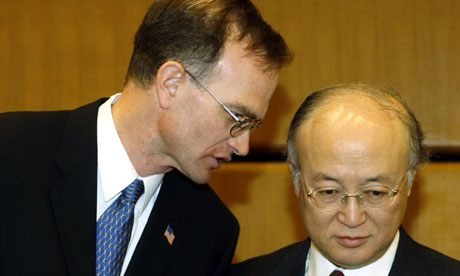Former officials warn of parallels between IAEA approach to Iran and mistakes over Iraq’s supposed weapons of mass destruction.
The head of the International Atomic Energy Agency (IAEA), the nuclear watchdog at the heart of the growing Iranian crisis, has been accused by several former senior officials of pro-western bias, over-reliance on unverified intelligence and of sidelining sceptics.
Yukiya Amano, a veteran Japanese diplomat, took command of the IAEA in July 2009. Since then, the west’s confrontation with Iran over its nuclear programme has deepened and threats of military action by Israel and the US have become more frequent.
At the same time, the IAEA’s reports on Iranian behaviour have become steadily more critical. In November, it published an unprecedented volume of intelligence pointing towards past Iranian work on developing a nuclear weapon, deeming it credible.
However, some former IAEA officials are saying that the agency has gone too far. Robert Kelley, a former US weapons scientists who ran the IAEA action team on Iraq at the time of the US-led invasion, said there were worrying parallels between the west’s mistakes over Iraq’s supposed weapons of mass destruction then and the IAEA’s assessment of Iran now.
“Amano is falling into the Cheney trap. What we learned back in 2002 and 2003, when we were in the runup to the war, was that peer review was very important, and that the analysis should not be left to a small group of people,” Kelley said.
“So what have we learned since then? Absolutely nothing. Just like [former US vice-president] Dick Cheney, Amano is relying on a very small group of people and those opinions are not being checked.”
Other former officials have also raised concern that the current IAEA is becoming an echo chamber, focused on suspicions over Iran’s programme, without the vigorous debate that characterised the era of Amano’s predecessor Mohamed ElBaradei.
They point to Amano’s decision, in March last year, to dissolve the agency’s office of external relations and policy co-ordination (Expo), which under ElBaradei had second-guessed some of the judgments made by the safeguards department inspectors. More
